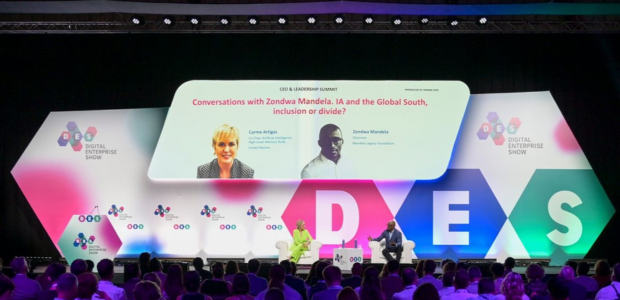
Artigas and Mandela discuss Africa's opportunities in accessing technology to avoid "data colonialism" at DES2024
The session framed within the AI4Humanity by UN panels at Digital Enterprise Show (DES), led by Carme Artigas, co-chair of the United Nations High-Level Advisory Body on Artificial Intelligence, featured the participation of Zondwa Mandela, grandson of Nelson Mandela and president of the Mandela Legacy Foundation.
Artigas kicked off the debate by addressing how we can avoid "data colonialism" in order to contribute to and facilitate Africa's access to data, technologies and digital AI solutions, "instead of paternalistically giving them solutions".
By 2050, the continent will have 25% of the world's population, so "it is necessary to protect data so that this becomes an opportunity", said Mandela. The world leader said that "technology must be affordable so that people in the south can also have access to it", especially in South Africa where the unemployment rate is 40%, one of the highest in the world.
This is precisely what the foundation he heads is working on, fighting for equality and human rights, and ensuring that AI serves as a positive agent of transformation on the African continent and is integrated globally, avoiding inequalities. "Africa represents a huge future market. By 2030 we want to create 775,000 jobs in South Africa, for which foreign investment will be crucial," he said.
Mandela also spoke of the opportunities to generate equitable and inclusive technology for social welfare. "Developers are very biased when it comes to creating technology, they use data from the global north and not from the south. There is a need to mitigate this bias, to see technology as something that should be inclusive.” At the same time, he believes it is essential to have "more regulation and attention to the end goals of technology development. We talk a lot about inclusion, but we are creating technology that can exacerbate inequalities.”
To boost the integration of technology solutions and talent in South Africa, Mandela said "re-education and support is needed to train people in soft and digital skills, but also to instil the concept of personal development".

